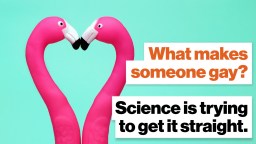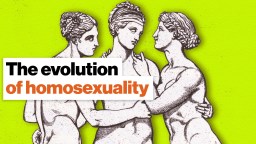gay
Poland has become an increasingly unwelcoming place for the LGBTQ community. Fifty diplomats hope to change that.
Sexuality is fluid and it’s important that people get to define it for themselves.
The answer depends on how we choose to balance religious freedom, social inclusion, and the search for self-identity.
Taking the fourth spot on Big Think’s 2019 top 10 countdown is the question: Evolutionarily speaking, is being gay still something of an enigma?
▸
10 min
—
with
Sally Susman explains how to use truth-telling moments to your future benefit.
▸
2 min
—
with
The surprising results come from a new GLAAD survey.
In most states, LGBTQ Americans have no legal protections against discrimination in the workplace.
Evolutionarily speaking, being gay is still something of an enigma
▸
10 min
—
with
People’s views can change. What do we do with that?
These great thinkers remind us that taking an unpopular, bold stance might not be madness.
How did human homosexuality evolve?
▸
4 min
—
with
America isn’t immune to attempts to remove books from libraries and schools, here are ten frequent targets and why you ought to go check them out.
Author, broadcaster, and financial advisor Alvin Hall posits that since he doesn’t fit into the narrowly defined idea of what a financial advisor should look like in the U.S., he fell through the cracks and didn’t get a fair chance.
▸
with
Bennett Singer explains why coming out matters—for the LGBTQ community and the straight community alike, and especially for those who are not in a safe position to do so.
▸
4 min
—
with
A study suggests people act aggressively on their prejudices when they have plausible deniability.
If you want to know the state of equality in the US, statistics are a good place to start.
▸
5 min
—
with















